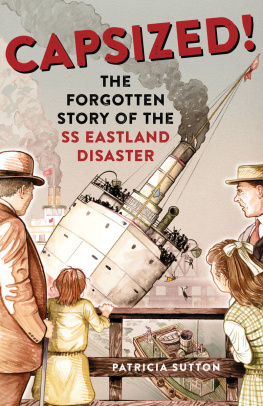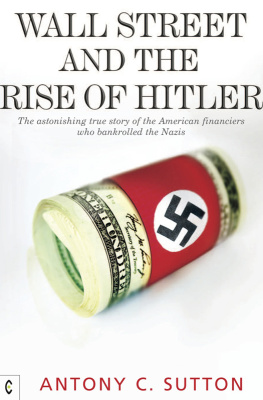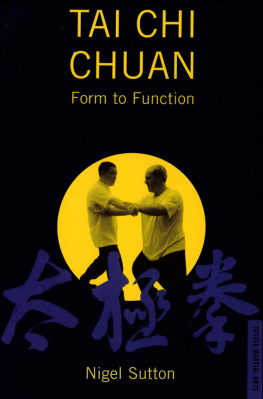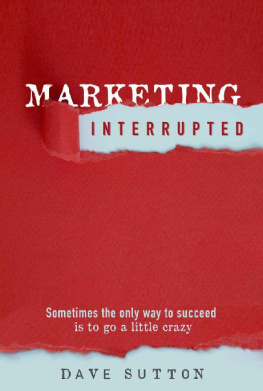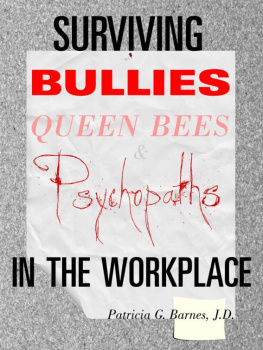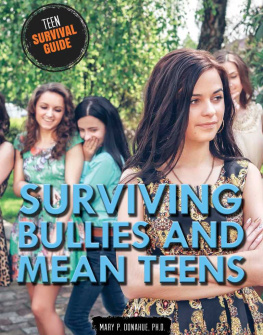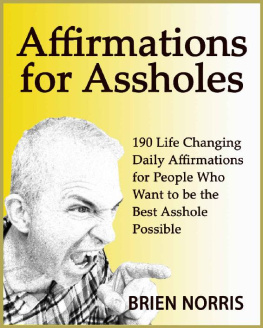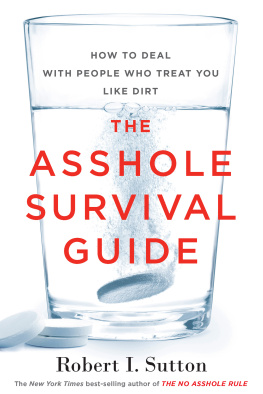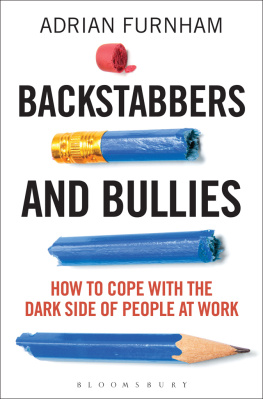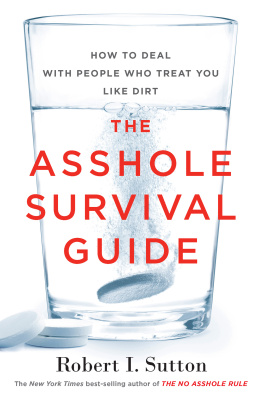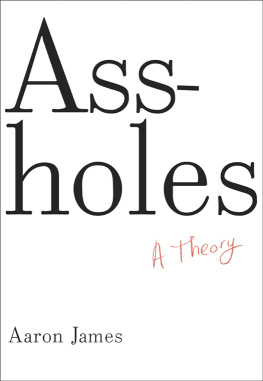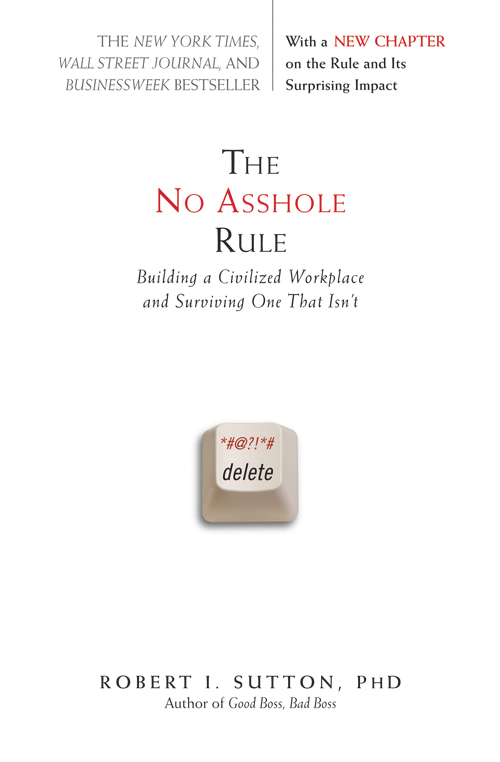Copyright 2007 by Robert Sutton
All rights reserved. Except as permitted under the U.S. Copyright Act of 1976, no part of this publication may be reproduced, distributed, or transmitted in any form or by any means, or stored in a database or retrieval system, without the prior written permission of the publisher.
Warner Business Books
Hachette Book Group
237 Park Avenue
New York, NY 10017
Visit our Web site at www.HachetteBookGroup.com.
The Warner Business Books name and logo are trademarks of Hachette Book Group, Inc.
First eBook Edition: February 2007
ISBN: 978-0-7595-1801-8
To Eve, Claire, and Tyler, with all my love
W hen I encounter a mean-spirited person, the first thing I think is: Wow, what an asshole!
I bet you do, too. You might call such people bullies, creeps, jerks, weasels, tormentors, tyrants, serial slammers, despots, or unconstrained egomaniacs, but for me at least, asshole best captures the fear and loathing that I have for these nasty people.
I wrote this book because most of us, unfortunately, have to deal with assholes in our workplaces at one time or another. The No Asshole Rule shows how these destructive characters damage their fellow human beings and undermine organizational performance. This little book also shows how to keep these jerks out of your workplace, how to reform those you are stuck with, how to expel those who cant or wont change their ways, and how to best limit the destruction that these demeaning creeps cause.
I first heard of the no asshole rule more than fifteen years ago, during a faculty meeting at Stanford University. Our small department was a remarkably supportive and collegial place to work, especially compared to the petty but relentless nastiness that pervades much of academic life. On that particular day, our chairman Warren Hausman was leading a discussion about who we ought to hire as a new faculty member.
One of my colleagues proposed that we hire a renowned researcher from another school, which provoked another to say, Listen, I dont care if that guy won the Nobel Prize.... I just dont want any assholes ruining our group. We all had a good laugh, but then we started talking in earnest about how to keep demeaning and arrogant jerks out of our group. From that moment on, when discussing whether to hire faculty, it was legitimate for any of us to question the decision by asking: The candidate seems smart, but would this hire violate our no asshole rule? And it made the department a better place.
The language in other workplaces is more polite, including rules against being a jerk, weasel, or bully. Other times, the rule is enforced but left unspoken. Whatever form the rule takes, a workplace that enforces the no asshole rule is where I want to be, not the thousands of organizations that ignore, forgive, or even encourage nastiness.
I didnt plan to write The No Asshole Rule. It all started in 2003 with a half-serious proposal that I made to Harvard Business Review when their senior editor Julia Kirby asked if I had any suggestions for HBRs annual list of Breakthrough Ideas. I told Julia that the best business practice I knew of was the no asshole rule, but HBR was too respectable, too distinguished, and quite frankly, too uptight to print that mild obscenity in their pages. I argued that censored and watered-down variations like the no jerk rule or the no bully rule simply didnt have the same ring of authenticity or emotional appeal, and I would be interested in writing an essay only if they actually printed the phrase the no asshole rule.
I expected HBR to politely brush me aside. I secretly looked forward to complaining about the sanitized and naive view of organizational life presented in HBRs pagesthat their editors lacked the courage to print language that reflected how people actually think and talk.
I was wrong. HBR not only published the rule (under the headline More Trouble Than Theyre Worth) in their Breakthrough Ideas section in February 2004, but the word asshole was printed a total of eight times in this short essay! After the article appeared, I received an even bigger surprise. Until this column, I had published four other HBR articles, and those pieces did generate some e-mail, phone calls, and press inquiries. But those reactions were trivial compared to the deluge provoked by the no asshole essay, even though it was buried among nineteen other Breakthrough Ideas. I received dozens and dozens of e-mails in response to the no asshole essay (and a follow-up piece that I published in CIO Insight), and I still get more e-mail each month.
The first e-mail I got was from a manager at a roofing company who said that the essay inspired him to finally do something about a productive but abusive employee. Then messages started rolling in from people in all kinds of jobs from all around the world: an Italian journalist, a Spanish management consultant, an accountant at Towers-Perrin in Boston, a minister counselor for management at the U.S. Embassy in London, the manager of a luxury hotel in Shanghai, a benefits manager at a museum in Pittsburgh, the CEO of Mission Ridge Capital, a researcher at the United States Supreme Court, and on and on.
And while I expected my academic colleagues who study topics like bullying and aggression at work to find the term asshole too crude and too imprecise, many of them expressed support, including one who wrote, Your work on the no asshole rule has certainly resonated with my colleagues and me. In fact, we often speculate that we would be able to predict a large proportion of variance in job satisfaction with one flaming asshole item. Basically, if we could ask whether [their] boss is one, we would not need any other [survey] items.... Thus, I agree that while potentially offensive, no other word quite captures the essence of this type of person.
My little HBR piece also generated press reports, stories, and interviews about the rule, at outlets including National Public Radio, Fortune Small Business, and my favorite, a column by Aric Press, editor in chief of the American Lawyer, who urged law firms to institute jerk audits. Press proposed to firm leaders that what Im suggesting is that you ask yourselves this question: why do we put up with this behavior? If the answer is 2,500 value-billed hours, at least you will have identified your priorities without incurring the cost of a consultant.
Of course, lawyers and law firms are not unique. Nasty people are found in virtually every occupation and country; for instance, arse, arsehole, and more politely, a nasty piece of work are commonly uttered in the United Kingdom and would fit our inventory of asshole synonyms. The term asshat is a slightly less crude variation that is popular in online communities. Assclown is a version that was popularized by World Wrestling Entertainment star Chris Jericho and The Office, the hit British (and now American) television series about an idiotic and oppressive boss. Whatever these creeps are called, many of them are clueless about their behavior. Even worse, some of them are proud of it. Other jerks are troubled and embarrassed by their behavior, but cant seem to contain or control their meanness. All are similar, however, in that they infuriate, demean, and damage their peers, superiors, underlings, and at times, clients and customers, too.
I was convinced to write The No Asshole Rule by the fear and despair that people expressed to me, the tricks they used to survive with dignity in asshole-infested places, the revenge stories that made me laugh out loud, and the other small wins that they celebrated against mean-spirited people. I also wrote



